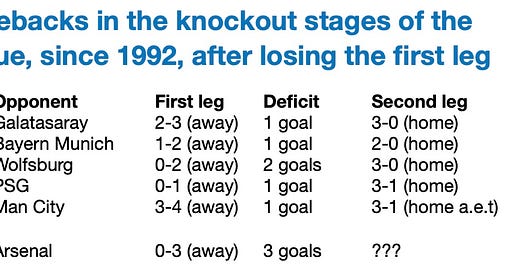After Arsenal's momentous Madrid win, what bang for his buck is Arteta getting?
There is a strong correlation in elite European football, not least the Premier League, between wage spending and success. Today we assess how Mikel Arteta is faring.
In the build-up to Tuesday’s Champions League quarter-final first leg against Real Madrid, Arsenal manager Mikel Arteta described it as “100 per cent the biggest game of my managerial career.”
What followed was an astonishing result, with mind-blowing goals, not least the brace scored from free-kicks by Declan Rice. This piece will recap what happened, and briefly consider Arsenal’s chances of making the semi-finals from 3-0 up.
But Tuesday’s landmark win is a good time to consider Arteta’s managerial performance since taking over in 2019, using a specific metric of what bang he’s been getting for his buck. To be more specific, is his Arsenal team outperforming what we might expect of them, given the club’s wage bill?
As most of you will know, there is a strong correlation between wage spend and long-term performance outcomes in elite European football, not least the Premier League.
When Arsene Wenger was the Gunners’ manager for almost 22 years between 1996 and 2018, he mostly produced Premier League finishing positions that at least met expectations against spending, and more often outstripped them.
There were only three seasons in his entire reign when Arsenal finished lower in the table than their wage spend merited.
In 2005-06 and in 2006-07 Arsenal finished fourth when they were the third-highest wage spenders in England’s top division. And in Wenger’s final season, 2017-18, they were the fifth biggest wage spenders behind Manchester United, Liverpool, Manchester City and Chelsea, but finished sixth in the table.
Back in 2013, at the behest of the Arsenal Supporters’ Trust, I wrote a deep-dive analysis of Wenger’s performance against resources from the time he arrived at Highbury in 1996 until 2013. A downloadable PDF of that 35-page analysis, “Arsene Wenger: What is he good for?” is here:
It includes season-by-season breakdowns of expenditure on players and wages and comparisons with spending by the other ‘Big 6’ clubs.
Trivia sidebar: the 11 players who played most often in the ‘Invincibles’ season of 2003-04 cost £44.35m. Combined!
Anyway, we’ll come back to Arteta and what kind of job he’s doing, compared to Wenger, in terms of “performing above budget”, but first some stats from Tuesday’s game.
Declan Rice had played 338 senior club matches for West Ham and Arsenal before Tuesday and had never scored from a direct free-kick before. Then he got two in 12 minutes.
According to OPTA, Rice's first free-kick had an xG of 0.037 (3.7%) and his second an xG of 0.063 (6.3%).
(If you need an xG explainer, go here).
The chances of Rice scoring both of those goals was 0.23%, equivalent to odds of 435-1.
His strikes were wondrous, the first with bend that Roberto Carlos would be proud of. Incidentally, the former Brazilian international was present at The Emirates to see Rice’s double.
Both free-kicks are in these highlights … (an earlier version of this piece was set to include just those goals but it didn’t work). You can also see both goals in a 1min 16sec clip here.
And while we’re on a highlights binge, I think Myles Lewis-Skelly’s contribution to the win was immense.
Two other stats jumped out from Tuesday, with both of these again courtesy of OPTA.
This was Real Madrid’s joint-heaviest defeat in the first leg of a UEFA Champions League knockout stage tie, along with a 4-1 loss at Borussia Dortmund in the semi-finals in 2012-13.
Arsenal’s victory was the 12th time an English side have won by 3+ goals in the first leg of a UEFA Champions League knockout stage tie, while each of the 11 previous instances have seen that team progress to the next round.
So what chance do Arsenal have of completing the job next week and sealing an aggregate win to take them to a Champions League semi-final for the first time since 2008-09?
Real Madrid are famous for their European comebacks, not least within individual games, clawing back deficits to get through.
But since the Champions League was rebranded as such in 1992-93, they have only had comebacks to advance on five occasions where they have lost the first leg of a two-legged tie in the CL knockout stages. And they have never come back from more than two goals down following a first-leg defeat. Four of the five times they were only a goal down.
Here are those five occasions.
But getting back to the main point of this piece: how good has Arteta been as a manager in performance terms set against (wage) resources? The numbers are below and paint a clear picture.





